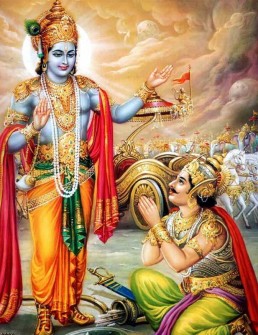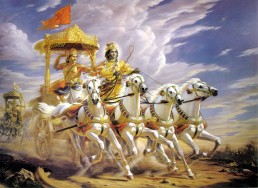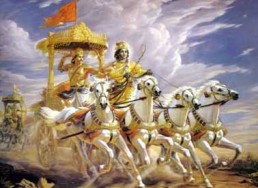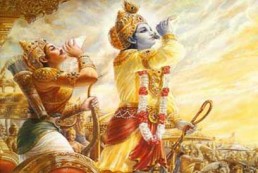Bhagavad Gita-Chapter 3 All Verses with Meaning and Audio
ज्यायसी चेत्कर्मणस्ते मता बुद्धिर्जनार्दन ।
तत्किं कर्मणि घोरे मां नियोजयसि केशव ॥ ३-१॥
jyāyasī cetkarmaṇaste matā buddhirjanārdana
tatkiṃ karmaṇi ghore māṃ niyojayasi keśava 3-1
तदेकं वद निश्चित्य येन श्रेयोऽहमाप्नुयाम् ॥ ३-२॥
tadekaṃ vada niścitya yena śreyo’hamāpnuyām 3-2
लोकेऽस्मिन् द्विविधा निष्ठा पुरा प्रोक्ता मयानघ ।
ज्ञानयोगेन साङ्ख्यानां कर्मयोगेन योगिनाम् ॥ ३-३॥
loke’smin dvividhā niṣṭhā purā proktā mayānagha
jñānayogena sāṅkhyānāṃ karmayogena yoginām 3-3
न च संन्यसनादेव सिद्धिं समधिगच्छति ॥ ३-४॥
na ca saṃnyasanādeva siddhiṃ samadhigacchati 3-4
कार्यते ह्यवशः कर्म सर्वः प्रकृतिजैर्गुणैः ॥ ३-५॥
kāryate hyavaśaḥ karma sarvaḥ prakṛtijairguṇaiḥ 3-5
इन्द्रियार्थान्विमूढात्मा मिथ्याचारः स उच्यते ॥ ३-६॥
indriyārthānvimūḍhātmā mithyācāraḥ sa ucyate 3-6
कर्मेन्द्रियैः कर्मयोगमसक्तः स विशिष्यते ॥ ३-७॥
karmendriyaiḥ karmayogamasaktaḥ sa viśiṣyate 3-7
शरीरयात्रापि च ते न प्रसिद्ध्येदकर्मणः ॥ ३-८॥
śarīrayātrāpi ca te na prasiddhyedakarmaṇaḥ 3-8
तदर्थं कर्म कौन्तेय मुक्तसङ्गः समाचर ॥ ३-९॥
tadarthaṃ karma kaunteya muktasaṅgaḥ samācara 3-9
अनेन प्रसविष्यध्वमेष वोऽस्त्विष्टकामधुक् ॥ ३-१०॥
anena prasaviṣyadhvameṣa vo’stviṣṭakāmadhuk 3-10
परस्परं भावयन्तः श्रेयः परमवाप्स्यथ ॥ ३-११॥
parasparaṃ bhāvayantaḥ śreyaḥ paramavāpsyatha 3-11
तैर्दत्तानप्रदायैभ्यो यो भुङ्क्ते स्तेन एव सः ॥ ३-१२॥
tairdattānapradāyaibhyo yo bhuṅkte stena eva saḥ 3-12
भुञ्जते ते त्वघं पापा ये पचन्त्यात्मकारणात् ॥ ३-१३॥
bhuñjate te tvaghaṃ pāpā ye pacantyātmakāraṇāt 3-13
यज्ञाद्भवति पर्जन्यो यज्ञः कर्मसमुद्भवः ॥ ३-१४॥
yajñādbhavati parjanyo yajñaḥ karmasamudbhavaḥ 3-14
तस्मात्सर्वगतं ब्रह्म नित्यं यज्ञे प्रतिष्ठितम् ॥ ३-१५॥
tasmātsarvagataṃ brahma nityaṃ yajñe pratiṣṭhitam 3-15
अघायुरिन्द्रियारामो मोघं पार्थ स जीवति ॥ ३-१६॥
aghāyurindriyārāmo moghaṃ pārtha sa jīvati 3-16
आत्मन्येव च सन्तुष्टस्तस्य कार्यं न विद्यते ॥ ३-१७॥
ātmanyeva ca santuṣṭastasya kāryaṃ na vidyate 3-17
न चास्य सर्वभूतेषु कश्चिदर्थव्यपाश्रयः ॥ ३-१८॥
na cāsya sarvabhūteṣu kaścidarthavyapāśrayaḥ 3-18
असक्तो ह्याचरन्कर्म परमाप्नोति पूरुषः ॥ ३-१९॥
asakto hyācarankarma paramāpnoti pūruṣaḥ 3-19
लोकसङ्ग्रहमेवापि सम्पश्यन्कर्तुमर्हसि ॥ ३-२०॥
lokasaṅgrahamevāpi sampaśyankartumarhasi 3-20
स यत्प्रमाणं कुरुते लोकस्तदनुवर्तते ॥ ३-२१॥
sa yatpramāṇaṃ kurute lokastadanuvartate 3-21
नानवाप्तमवाप्तव्यं वर्त एव च कर्मणि ॥ ३-२२॥
nānavāptamavāptavyaṃ varta eva ca karmaṇi 3-22
मम वर्त्मानुवर्तन्ते मनुष्याः पार्थ सर्वशः ॥ ३-२३॥
mama vartmānuvartante manuṣyāḥ pārtha sarvaśaḥ 3-23
सङ्करस्य च कर्ता स्यामुपहन्यामिमाः प्रजाः ॥ ३-२४॥
saṅkarasya ca kartā syāmupahanyāmimāḥ prajāḥ 3-24
कुर्याद्विद्वांस्तथासक्तश्चिकीर्षुर्लोकसङ्ग्रहम् ॥ ३-२५॥
kuryādvidvāṃstathāsaktaś cikīrṣurlokasaṅgraham 3-25
जोषयेत्सर्वकर्माणि विद्वान्युक्तः समाचरन् ॥ ३-२६॥
joṣayetsarvakarmāṇi vidvānyuktaḥ samācaran 3-26
अहङ्कारविमूढात्मा कर्ताहमिति मन्यते ॥ ३-२७॥
ahaṅkāravimūḍhātmā kartāhamiti manyate 3-27
गुणा गुणेषु वर्तन्त इति मत्वा न सज्जते ॥ ३-२८॥
guṇā guṇeṣu vartanta iti matvā na sajjate 3-28
तानकृत्स्नविदो मन्दान्कृत्स्नविन्न विचालयेत् ॥ ३-२९॥
tānakṛtsnavido mandānkṛtsnavinna vicālayet 3-29
निराशीर्निर्ममो भूत्वा युध्यस्व विगतज्वरः ॥ ३-३०॥
nirāśīrnirmamo bhūtvā yudhyasva vigatajvaraḥ 3-30
श्रद्धावन्तोऽनसूयन्तो मुच्यन्ते तेऽपि कर्मभिः ॥ ३-३१॥
śraddhāvanto’nasūyanto mucyante te’pi karmabhiḥ 3-31
सर्वज्ञानविमूढांस्तान्विद्धि नष्टानचेतसः ॥ ३-३२॥
sarvajñānavimūḍhāṃstān viddhi naṣṭānacetasaḥ 3-32
प्रकृतिं यान्ति भूतानि निग्रहः किं करिष्यति ॥ ३-३३॥
prakṛtiṃ yānti bhūtāni nigrahaḥ kiṃ kariṣyati 3-33
तयोर्न वशमागच्छेत्तौ ह्यस्य परिपन्थिनौ ॥ ३-३४॥
nabhaśca pṛthivīṃ caiva tumulo’bhyanunādayan 3-34
स्वधर्मे निधनं श्रेयः परधर्मो भयावहः ॥ ३-३५॥
svadharme nidhanaṃ śreyaḥ paradharmo bhayāvahaḥ 3-35
अथ केन प्रयुक्तोऽयं पापं चरति पूरुषः ।
अनिच्छन्नपि वार्ष्णेय बलादिव नियोजितः ॥ ३-३६॥
atha kena prayukto’yaṃ pāpaṃ carati pūruṣaḥ
anicchannapi vārṣṇeya balādiva niyojitaḥ 3-36
काम एष क्रोध एष रजोगुणसमुद्भवः ।
महाशनो महापाप्मा विद्ध्येनमिह वैरिणम् ॥ ३-३७॥
kāma eṣa krodha eṣa rajoguṇasamudbhavaḥ
mahāśano mahāpāpmā viddhyenamiha vairiṇam 3-37
यथोल्बेनावृतो गर्भस्तथा तेनेदमावृतम् ॥ ३-३८॥
yatholbenāvṛto garbhastathā tenedamāvṛtam 3-38
कामरूपेण कौन्तेय दुष्पूरेणानलेन च ॥ ३-३९॥
kāmarūpeṇa kaunteya duṣpūreṇānalena ca 3-39
एतैर्विमोहयत्येष ज्ञानमावृत्य देहिनम् ॥ ३-४०॥
etairvimohayatyeṣa jñānamāvṛtya dehinam 3-40
पाप्मानं प्रजहि ह्येनं ज्ञानविज्ञाननाशनम् ॥ ३-४१॥
pāpmānaṃ prajahi hyenaṃ jñānavijñānanāśanam 3-41
मनसस्तु परा बुद्धिर्यो बुद्धेः परतस्तु सः ॥ ३-४२॥
manasastu parā buddhiryo buddheḥ paratastu saḥ 3-42
जहि शत्रुं महाबाहो कामरूपं दुरासदम् ॥ ३-४३॥
ॐ तत्सदिति श्रीमद्भगवद्गीतासूपनिषत्सु
ब्रह्मविद्यायां योगशास्त्रे श्रीकृष्णार्जुनसंवादे
कर्मयोगो नाम तृतीयोऽध्यायः ॥ ३॥
jahi śatruṃ mahābāho kāmarūpaṃ durāsadam 3-43
oṃ tatsaditi śrīmadbhagavadgītāsūpaniṣatsu
brahmavidyāyāṃ yogaśāstre śrīkṛṣṇārjunasaṃvāde
karmayogo nāma tṛtīyo’dhyāyaḥ 3

Description
Bhagavad Gita Chapter 3 Summary
Karma Yoga – Path of Selfless Service
In Chapter 3 of the Bhagavad Gita, the Lord teaches the importance of action and explains why and how one must act in the world so that the mind and intellect are purified and relieved of their false attachments, thereby making them receptive to the Self-knowledge that was emphasized in the previous chapter. Below are the main themes of Chapter 3:
Verses 1 – 7
Introduction
Verses 8 – 20 (First Line)
Karmayoga
Verses 20 (Second Line) – 29
The role of a wise person
Verses 30 – 35
Summary
Verses 36 – 43
The problem of desire and its solution
Gita Chapter 3 – Commentary by Swami Paramarthananda
Background
In the second chapter, the Lord praised Self-knowledge right from the beginning (11, 21, 46) and criticized the karma-kāṇḍa of the Vedas (42 to 45). Thereafter, He asked Arjuna to take to karma (48). This creates a serious doubt in Arjuna and the third chapter begins with this doubt.
Arjuna asks—“Oh Lord! You seem to confuse me by contradictory statements. Tell me one—knowledge or karma—which will lead me to Mokṣa” (1, 2).
Bhagavān answers that there are two lifestyles called karma-yoga-niṣṭhā (social life) and jñāna-yoga-niṣṭhā (secluded life). One can choose anyone of them as a householder or as a monk (3).
(But there is no choice between karma and knowledge. Whatever lifestyle one chooses, one has to follow relevant karma for purity and then pursue knowledge to discover the freedom that is one’s true nature.
Of these two lifestyles, Krishna gives preference to social life throughout the Gītā. In the Upaniṣads we find the latter emphasized. Choice depends on the maturity of the seeker.)
From the 4th to the 7th verse, Krishna condemns inaction and praises an alert and active life. Inaction should be avoided because:
1. Neither purity nor knowledge can be achieved by that (4);
2. Desires force one to act and inaction will be a suppression (5);
3. A mind without occupation will be idle. It will brood over sense pleasures. Such a hypocritical mind will soon fall (6). (Also refer II-62, 63)
From the 8th to the 20th verse (1st line), Bhagavān deals with one of the most beautiful and important topics of the Gītā viz. karma-yoga.
Having created the world and the intelligent human beings, the Lord Himself advocated (in the Vedas) the way of life which is karma-yoga. By following this, material and spiritual progress can be attained (10 to 14).
Since it is the teaching of the Lord, the Master of the universe (Svāmī), human being has to take it as a command (niyatam) and obey it as a servant (bhṛtya) of the Lord (8).
When we follow the teachings of the Lord, it becomes a gesture of our appreciation for all the gifts and blessings that the Lord has bestowed upon us. Thus, our work becomes a worship or loving offering (yajña) to God. It purifies the mind also (9, 13).
Lastly, karma-yoga is necessary to maintain the harmony of the universe upon which we are dependent. The working of the universe being a cyclic process, with the human beings as its important link, one must be aware of one’s responsibility (duty). Thus, karma-yoga is only the duty (kāryam) of a responsible citizen of the world. One who does not discharge it proves himself/herself to be an immature human being (14 to 16).
Thus, karma-yoga is to be pursued because:
1. It contributes to material and spiritual progress (yoga).
2. It is the commandment (niyatam) of the Master of the universe.
3. It is our grateful offering (yajña) to the Lord, acknowledging His gifts.
4. It is the only way of maintaining the harmony (dharma).
(In this chapter, Bhagavān does not talk about kāmya-karma — actions to fulfill the desires. This shows that true karma-yoga does not involve kāmya-karma. Hence a seeker must gradually reduce kāmya-karma, even to become a true karma-yogī.)
Karma-yoga ultimately leads one to liberation through the stages of purity (śuddhi), enquiry (vicāra) and knowledge (jñānam) (17, 18). Krishna concludes the topic by citing the example of Janaka who successfully pursued knowledge while remaining in karma-yoga-niṣṭhā (social life) (20, 1st line).
From the 20th (2nd line) to the 29th verse, the Lord talks about the role of a wise man in the society, taking Arjuna as one. Any person with a higher status or knowledge (śreṣṭha), can influence others positively or negatively. Hence, even though Arjuna might not benefit from this war, he has to fight as kṣaṭriya’s duty and set an example to others. Else, he will be responsible for anarchy in his own time as well as in the future (22 to 25).
Thus, both the wise and the ignorant should act — the former for teaching others, and the latter, for purity. The only difference is that the former will be detached while the latter won’t be (27 to 29).
The 30th verse summarizes karma-yoga, giving five conditions:
1. Keep the spiritual goal.
2. Offer all actions to the Lord.
3. Don’t be concerned about the result.
4. Be free from possessiveness; and
5. Be calm.
One who follows karma-yoga reaches the goal of life and the other is lost (31, 32).
Likes and dislikes (rāga-dveṣa) born of habits (vāsanas) pull a person astray. Still, a person should not go by what he likes to do but what he has to do (duty), even if it involves difficulties (33 to 35).
As an answer to Arjuna’s question (36), Krishna elaborately discusses the problem of kāma-krodha (rāga-dveṣa). They are the real enemies of a seeker (37). Clouding the knowledge, they force a person to run after endless insatiable desires and take away all the chances of peace and progress (38, 39). The senses, the mind, and the intellect are the base of desires. They have to be taken care of (40, 41).
(Durvāsanās should be replaced by śubhavāsanās by practice. False values should be replaced by right ones through discrimination.)
Once kāma becomes weak, one can discover the Ātmā, which is beyond the senses, the mind, and the intellect and thus destroy kāma for good (42, 43).
Gita 3rd Chapter – Main Points
1. Introduction: 1 to 7
2. Karmayoga: 8 to 20 (1st line)
3. The role of a wise person: 20 (2nd line) to 29
4. Summary: 30 to 35
5. The problem of desire and its solution: 36 to 43
Since karma-yoga is the main topic, this chapter is called Karma-yoga.
Other Bhagavad Gita Shlokams
Bhagavad Gita
The Bhagavad Gita, or the Song of the Lord, is a dialogue between Krishna, an incarnation of Vishnu, and his friend and disciple, Arjuna. Composed of 701 Shlokas arranged in 18 chapters, the Gita is one of the best-known philosophical texts of…
Bhagavad Gita-Chapter 01 All Verses with Meaning and Audio
Bhagavad Gita Chapter 1 All Verses for easy chanting along with Audio and Meaning. Lyrics In English, Sanskrit, Hindi, Telugu, Tamil, Gujarati, Bengali and many more languages.
Bhagavad Gita-Chapter 02 All Verses with Meaning and Audio
Bhagavad Gita Chapter 2 All Verses for easy chanting along with Audio and Meaning. Lyrics In English, Sanskrit, Hindi, Telugu, Tamil, Gujarati, Bengali and many more languages.
Bhagavad Gita-Chapter 04 All Verses with Meaning and Audio
Bhagavad Gita Chapter 4 All Verses for easy chanting along with Audio and Meaning. Lyrics In English, Sanskrit, Hindi, Telugu, Tamil, Gujarati, Bengali and many more languages.
Bhagavad Gita-Chapter 05 All Verses with Meaning and Audio
Bhagavad Gita Chapter 5 All Verses for easy chanting along with Audio and Meaning. Lyrics In English, Sanskrit, Hindi, Telugu, Tamil, Gujarati, Bengali and many more languages.
Bhagavad Gita-Chapter 06 All Verses with Meaning and Audio
Bhagavad Gita Chapter 6 All Verses for easy chanting along with Audio and Meaning. Lyrics In English, Sanskrit, Hindi, Telugu, Tamil, Gujarati, Bengali and many more languages.
Bhagavad Gita-Chapter 07 All Verses with Meaning and Audio
Bhagavad Gita Chapter 7 All Verses for easy chanting along with Audio and Meaning. Lyrics In English, Sanskrit, Hindi, Telugu, Tamil, Gujarati, Bengali and many more languages.
Bhagavad Gita-Chapter 08 All Verses with Meaning and Audio
Bhagavad Gita Chapter 8 All Verses for easy chanting along with Audio and Meaning. Lyrics In English, Sanskrit, Hindi, Telugu, Tamil, Gujarati, Bengali and many more languages.
Bhagavad Gita-Chapter 09 All Verses with Meaning and Audio
Bhagavad Gita Chapter 9 All Verses for easy chanting along with Audio and Meaning. Lyrics In English, Sanskrit, Hindi, Telugu, Tamil, Gujarati, Bengali and many more languages.
Bhagavad Gita-Chapter 10 All Verses with Meaning and Audio
Bhagavad Gita Chapter 10 All Verses for easy chanting along with Audio and Meaning. Lyrics In English, Sanskrit, Hindi, Telugu, Tamil, Gujarati, Bengali and many more languages.
Bhagavad Gita-Chapter 11 All Verses with Meaning and Audio
Bhagavad Gita Chapter 11 All Verses for easy chanting along with Audio and Meaning. Lyrics In English, Sanskrit, Hindi, Telugu, Tamil, Gujarati, Bengali and many more languages.
Bhagavad Gita-Chapter 12 All Verses with Meaning and Audio
Bhagavad Gita Chapter 12 All Verses for easy chanting along with Audio and Meaning. Lyrics In English, Sanskrit, Hindi, Telugu, Tamil, Gujarati, Bengali and many more languages.
Bhagavad Gita-Chapter 13 All Verses with Meaning and Audio
Bhagavad Gita Chapter 13 All Verses for easy chanting along with Audio and Meaning. Lyrics In English, Sanskrit, Hindi, Telugu, Tamil, Gujarati, Bengali and many more languages.
Bhagavad Gita-Chapter 14 All Verses with Meaning and Audio
Bhagavad Gita Chapter 14 All Verses for easy chanting along with Audio and Meaning. Lyrics In English, Sanskrit, Hindi, Telugu, Tamil, Gujarati, Bengali and many more languages.
Bhagavad Gita-Chapter 15 All Verses with Meaning and Audio
Bhagavad Gita Chapter 15 All Verses for easy chanting along with Audio and Meaning. Lyrics In English, Sanskrit, Hindi, Telugu, Tamil, Gujarati, Bengali and many more languages.
Bhagavad Gita-Chapter 16 All Verses with Meaning and Audio
Bhagavad Gita Chapter 16 All Verses for easy chanting along with Audio and Meaning. Lyrics In English, Sanskrit, Hindi, Telugu, Tamil, Gujarati, Bengali and many more languages.
Bhagavad Gita-Chapter 17 All Verses with Meaning and Audio
Bhagavad Gita Chapter 17 All Verses for easy chanting along with Audio and Meaning. Lyrics In English, Sanskrit, Hindi, Telugu, Tamil, Gujarati, Bengali and many more languages.
Bhagavad Gita-Chapter 18 All Verses with Meaning and Audio
Bhagavad Gita Chapter 18 All Verses for easy chanting along with Audio and Meaning. Lyrics In English, Sanskrit, Hindi, Telugu, Tamil, Gujarati, Bengali and many more languages.
Gita Dhyanam
The Gītā Dhyānam, also called the Gītā Dhyāna or the Dhyāna Ślokas associated with the Gītā, is a 9-verse Sanskrit poem that has often been attached to the Bhagavad Gita, one of the most important scr
Bhagavad Gita-Chapter 3 All Verses with Meaning and Audio – Bhagavad Gita – Bhagavad Gita Chapter 3 All Verses Easy Chanting with Audio and Meaning, Lyrics




